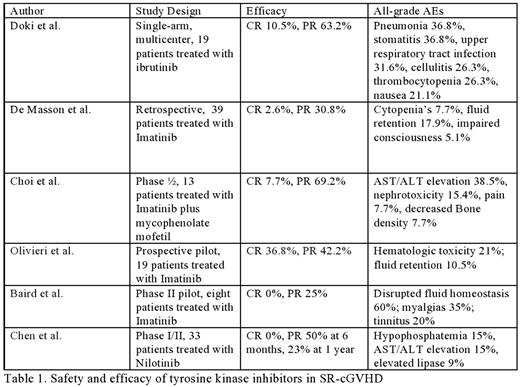Abstract
Introduction:
Different novel drugs have been investigated for steroid-refractory chronic graft versus host disease (SR-cGVHD). Despite Rixulotinib approval, the need for more therapeutic options is still warranted. Tyrosine kinase (TK) inhibitors are known to inhibit pathways involved in cGVHD pathophysiology, including transforming growth factor (TGF)-β and platelet-derived growth factor receptor (PDGF-r) signaling pathways. Therefore, this drug class is currently under investigation in treating SR cGVHD.
Methods:
A comprehensive search was conducted across various data sets, including PubMed, Cochrane, and Embase. A review of the most recent data is summarized in this abstract.
Results:
Results from a randomized single-arm multicenter study highlighted the efficacy of Bruton's TK inhibitor ibrutinib with an acceptable safety profile. Similarly, multiple pilot studies show Imatinib, BCR/ABL TK inhibitor, as a suitable alternative treatment for steroid-refractory cGVHD. One study shows higher efficacy of Imatinib when combined with mycophenolate. A single phase I/II study highlighted the potential role of nilotinib. A list of complete and partial response rates of these studies with their most common adverse effects are listed in the table. 1.
A cumulative analysis of these studies showed that overall these three tyrosine kinase inhibitors showed a median complete response (CR) rate of 3.85% with ranges from 0 to 36.80% and a median partial response (PR) rate of 55.50% with ranges of 25-80%. These results, although not groundbreaking but still are encouraging.
Conclusion
Tyrosine kinase inhibitors are promising results in treating patients with SR cGVHD with a good side effect profile. More research is warranted to explore this drug class in this patient population.
Disclosures
No relevant conflicts of interest to declare.
Author notes
Asterisk with author names denotes non-ASH members.


This feature is available to Subscribers Only
Sign In or Create an Account Close Modal